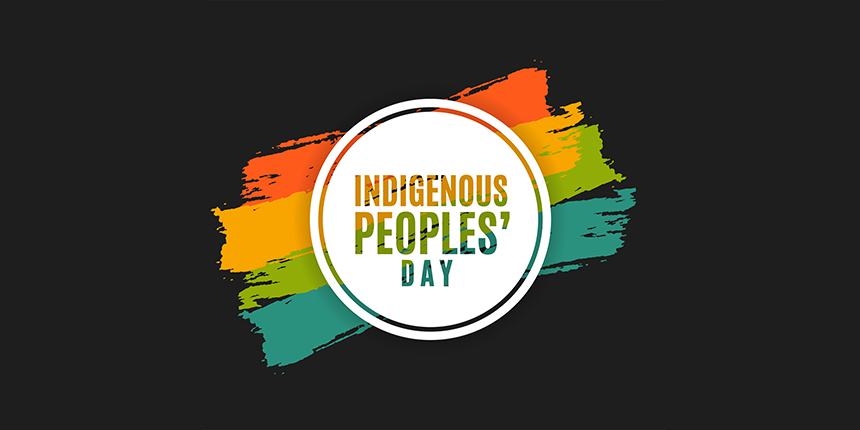

June is National Indigenous History Month in Canada, and June 21 is National Indigenous Peoples Day. Both are a time to recognize the rich history, heritage, resilience, and diversity of First Nations, Inuit, and Métis.
National Indigenous History Month and National Indigenous Peoples Day also present opportunities for non-Indigenous Canadians to learn about First Nations, Inuit, and Métis stories and cultures, and challenge themselves to see the world and our shared history through another lens. APTN has a variety of programming this month that focuses on the accomplishments and stories of Indigenous communities, offering viewers meaningful ways to engage with these narratives. CBC has also compiled a list of podcasts, books, and cross-platform programming that celebrate First Nations, Inuit, and Métis peoples.
For engineers specifically, National Indigenous History Month and National Indigenous Peoples Day are good occasions to consider their unique place in the journey to Truth and Reconciliation. Engineers Canada, guided by the Indigenous Advisory Committee, and the engineering regulators have commissioned research and created resources for engineers to advance Truth and Reconciliation in the profession.
Land Acknowledgement Guide
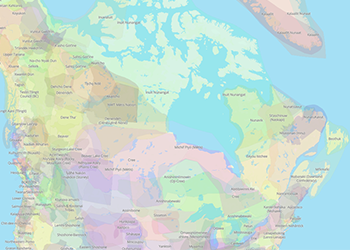
Acknowledging Indigenous land, treaties, and traditional territories is an important protocol that can be a meaningful practice for engineers to incorporate into their workplaces. Engineers Canada has developed a guide for our staff, volunteers, and others to acknowledge First Peoples and traditional lands when they host meetings, public events, or conferences. The focus of this guide is not to make land acknowledgements a ‘check-box’ exercise, but rather to deeply understand the value land plays to Indigenous peoples and the need to mitigate the erasure of Indigenous communities from Canadian past and present.
Guideline for Engineers and Engineering Firms on Indigenous Consultation and Engagement
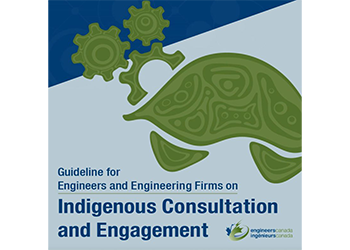
Developed by the Canadian Engineering Qualifications Board with consultation from Urban Systems, this guideline intends to promote meaningful engagement between engineers and Indigenous communities when it comes to engineering work.
Calls to Action and Calls to Justice
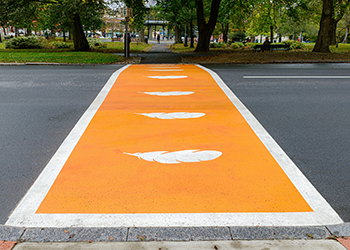
In reflecting on our unique place in the journey to Truth and Reconciliation, engineers are encouraged to read the Truth and Reconciliation Commission (TRC)'s Calls to Action, specifically call 92. Engineers and Geoscientists British Columbia has also done work to advance five recommendations arising from the TRC’s Calls to Action and their impact on engineers.
Engineers are also encouraged to read the Missing and Murdered Indigenous Women and Girls’ Calls for Justice, specifically call 13 about extractive and development industries.
Resources and reports
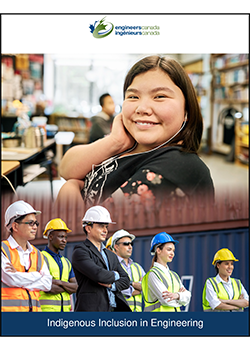
To support its work in acting in the spirit of reconciliation, Engineers Canada undertakes research to better understand the experiences of Indigenous people in engineering education and in the engineering profession. Engineers Canada has published research and reports on the topics of Indigenous representation in engineering, Indigenous access to engineering education, and truth and reconciliation in engineering education.
A priority for Engineers Canada
Engineers Canada’s upcoming 2025-2029 Strategic Plan makes Truth and Reconciliation a strategic priority for the organization over the next five years. To inform this work, Engineers Canada has commissioned the creation of two reports: Engineering and Colonialism: Examining the Historical Impact of Projects and Practices on Indigenous Peoples in Canada, and Engineering and Colonialism: Reflecting on the Present-Day Impact of Engineering Projects and Practices on Indigenous Peoples in Canada. Developed in consultation with Engineers Canada’s Indigenous Advisory Committee, the historical and present-day reports will inform the engineering profession’s journey towards reconciliation.


